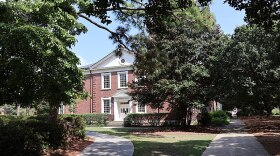UNC-Chapel Hill senior Jailen Wallis has always been tempted to become a high school English teacher.
She's cutting across campus on her way to her work-study at the library. A literature junkie, she loves the idea of teaching young people to enjoy reading and writing as much as she does. But Wallis will graduate in May with degrees in sociology and English—not education.
"Teaching in North Carolina right now is not worth it, unless you can’t imagine doing anything other than teaching," Wallis explained.
Wallis’ mother is a teacher, and Wallis knows what challenges of the job are, and what the pay is.
"It’s not a job that you leave at the end of the day at 4 or 4:30 or 5 or 5:30, or whenever you finish with all your staff meetings," she said. "You work all the time. You grade papers, you make lesson plans, you respond to emails...It’s just a constant, constant job."
Wallis is not the only student who feels that way about the profession. Almost all of North Carolina’s public universities are turning out fewer teachers these days. Enrollment in UNC schools of education and teacher preparation programs has plummeted 30 percent in the last five years—that's in both master's and bachelor's degree programs.

"Teaching in North Carolina right now is not worth it, unless you can't imagine doing anything other than teaching."
For Wallis, the low pay, the long hours, and the amount of standardized testing teachers have to worry about deterred her from entering the school of education. But she says the General Assembly’s 2013 decision to end higher pay for teachers with master’s degrees was the final blow.
"There’s absolutely no incentive right now to go into it with your masters," Wallis said. "You’re starting at the same salary as someone with a bachelor’s degree in teaching."
University system officials say the loss of both master’s pay and the Teaching Fellows program were major hits to recruitment efforts. The Teaching Fellows program provided scholarships to thousands of students who agreed to spend four years in the classroom. After the legislature did away with the program in 2011, enrollment in teacher prep programs tanked. And after the General Assembly ended master’s pay, enrollment dropped again.
Deborah Eaker-Rich is the interim dean of the school of education at UNC-Chapel Hill, where enrollment fell 40 percent between 2012 and 2013. She says pay is an issue for many would-be education students, but that students are also picking up on a negative public narrative about education. She notes enrollment is dropping in schools of education in other states like California and New York, where teacher pay is much higher.
Eaker-Rich rattles off the different narratives she hears about public schools: "School’s don’t work, teachers are not professional, teachers don't know what to do with students...and it’s really not based in much, it sees to me."
Eaker-Rich says A-F school grading systems make many schools look bad, but are often poor measures of how good teachers are at their jobs.
"I am very concerned about where we are going to get our teachers in the future."
UNC teacher preparation programs have beefed up their recruiting efforts—going into high schools and community colleges. They’re even targeting mid-career professionals and undecided college majors. Alisa Chapman directs academic and university programs for the UNC system. She says there are signs efforts are working.
"We’re seeing a much slower rate of decline in our schools of education, which is good. I think we’re bottoming out," she said. Schools saw just over a 3 percent decline in enrollment in 2015, compared to 12 percent the year before.
But Chapman says the declines are still concerning. Some school districts faced shortages in elementary teachers this school year—positions usually easy to staff. Chapman points out that fewer students in UNC schools of education mean the state has to rely more and more on out-of-state teachers, and those who get certified through alternative entry—without going through a school of education. But data show for those teachers, student outcomes are not as good, and that they don't stay as long.

State Superintendent June Atkinson applauds the university system’s efforts. But she says there’s only so much they can do.
"Beginning pay now allows us to compete very favorably with all our surrounding states."
"They don’t control the working conditions; they don’t control the salary," she said. Those problems, she explains, are up to the General Assembly, local boards of education, and school administrators.
Republican senior senator Jerry Tillman of Randolph County says lawmakers addressed the pay issue two years ago, when they increased the starting salary for teachers to $35,000.
"Do people forget that? Do teachers forget that?" he asked. "Beginning pay now allows us to compete very favorably with all our surrounding states," Tillman said. "It hasn’t had time to have its impact on these numbers that are in the education programs and the universities. But it will."

Atkinson is not counting on it. Even with the recent increase, North Carolina ranks 42nd in the nation in teacher pay, and the lowest in the southeast. She proposed a 10 percent across-the-board raise for North Carolina teachers—a figure leading Republicans in the legislature have called unrealistic.
Tillman says, instead, Republicans are working on pay increases that reward performance and those who teach hard-to-staff subjects, or in disadvantaged schools. But Atkinson is worried.
"I am very concerned about where we are going to get our teachers in the future," Atkinson said. "I see that as a big red flag that unless we do something, we’re going to be in trouble."
Republicans say they're likely to do something about pay for veteran teachers in the short session, beginning in April. But, they warn, it will depend on tax revenues.
CORRECTION: An earlier version of this story incorrectly stated that the Teaching Fellows program provided full scholarships. The program offered $6,500 a year for four years.










